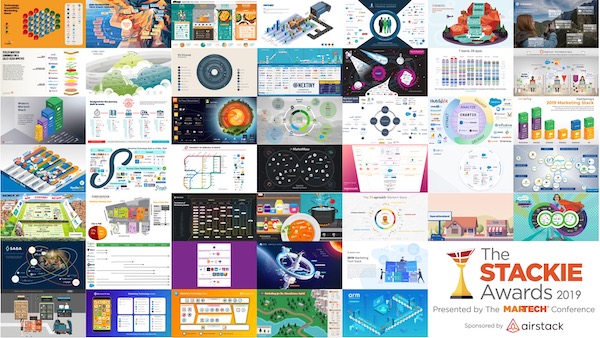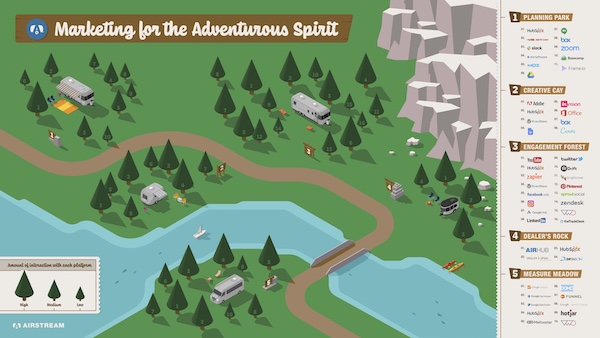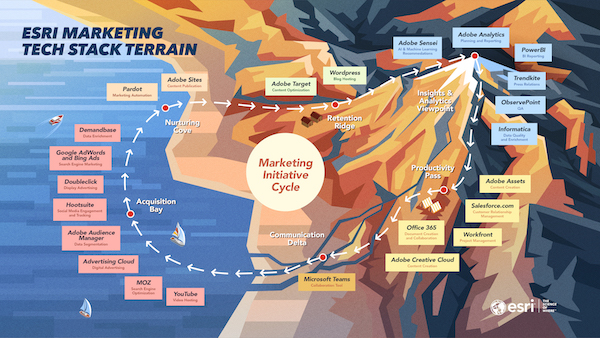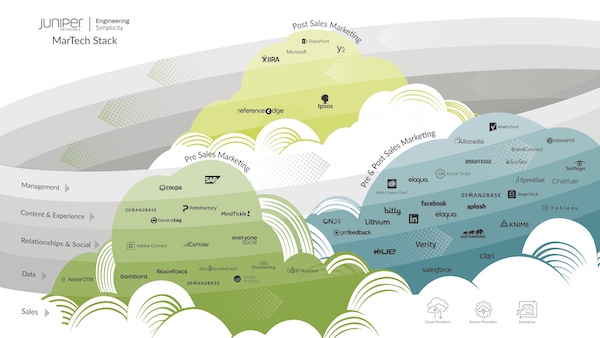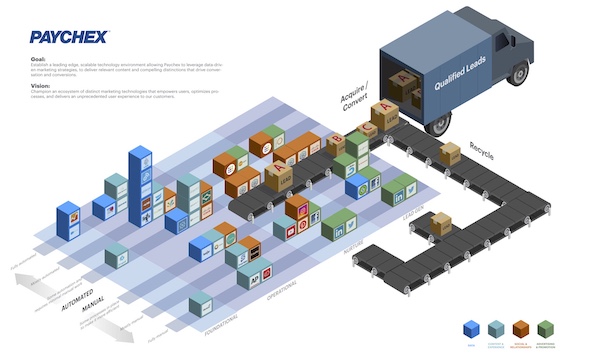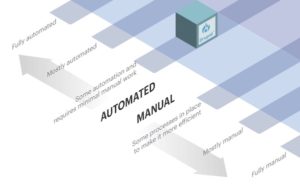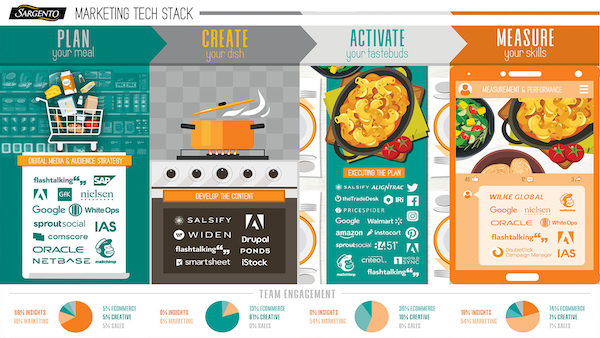For the 5th year, we’ve run The Stackies Awards, where marketers send in a single slide that illustrates their “stack” — the collection of marketing technology tools they use and how they conceptualize them together.
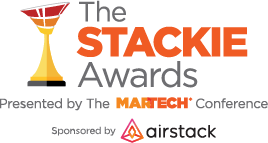
We received 48 entries this year, and some truly incredible ones. Airstack graciously sponsored the awards this time. And, as promised, we’ve gladly made a donation of $4,800 to Girls Who Code on behalf of the 48 entrants
ABinBev, Airstream, Alliant Credit Union, Artemis Health, BraunAbility, Esri, G Adventures, Juniper Networks, Lola, Nationwide Advisory Solutions, Paychex, Racing Post, Sargento Foods, The Telegraph, Tennant, and the University of Nebraska at Omaha were some of the non-martech brands who participated this year. Plus many wonderful entries from companies within the marketing tech industry.
Even Third Door Media, the producers of the MarTech conference, joined in with their stack.
The result is a wealth of great examples of real-world marketing stacks. You can check out nearly 200 stacks from 2015, 2016, 2017, and 2018. It’s not just learning about which tools people use for different capabilities — although that’s certainly quite helpful. It’s about understanding the different strategies that marketing teams apply in organizing their stacks.
Some map martech products to the customer journey. Others map them to internal workflows. Some illustrate the amount of time they spend with each tool. Some indicate which products are foundational “systems of record” and which are more agile or experimental “systems of innovation.”
While everyone who participates in The Stackies is a hero in my book — it’s the community as the whole who “wins” from all these contributions — we do select five entries as award winners each year. They’re chosen by the quality of their stack visualization and their educational value: how they help us think about our own marketing stacks from a different perspective. This year, our winners were (in alphabetical order):
- Airstream
- Esri
- Juniper Networks
- Paychex
- Sargento Foods
I’ll briefly highlight what the judges — Marc Sirkin, Henry Powderly, and myself — liked about each. Below that you can also find the complete deck of all 48 entries into the 2019 MarTech Stackies.
MarTech Stackie Winner: Airstream Marketing Stack
Airstream is a repeat participant in The Stackies, for which we’re enormously grateful. You can check out their entry in last year’s Stackies awards.
This year, they expanded the list of tools that they include in their marketing stack in five categories:
- Planning
- Creative
- Engagement
- Dealers
- Measurement
The design of their entry is attractive and on brand. Each tree represents a martech tool in their stack, and the categories are clustered as camping destinations on the map.
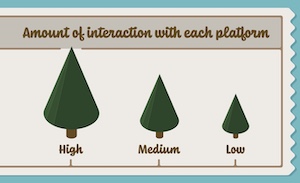
One of the clever aspects of their visualization that we particularly like is showing the time spent interacting with each tool by the size of the tree: low, medium, and high. It helps reveal which tools tend to be at the center of users’ workflows. Super interesting view of the stack.
Airstream’s entry into The Stackies was produced by Element Three, who also had two other finalist entries in this year’s award — an amazing animated GIF of BraunAbility’s marketing stack (needs to open in its own window) and their own agency’s stack.
MarTech Stackie Winner: Esri Marketing Stack
For its gorgeous design alone this entry deserved an award. Esri is one of the leading suppliers of geogrpahic information system (GIS) software — so the terrain metaphor harmonizes nicely with their brand.
You might be thinking: does that really matter? It’s not how a stack looks. It’s how it works. Relatively speaking, that’s true. However, there are good reasons to celebrate the aesthetics of a Stackie entry like this:
- It makes The Stackies more fun. We learn better when the materials we’re learning from are engaging and encourage us to look at the material from a different angle.
- Because all the entries to The Stackies are openly shared with the community, it’s an opportunity to promote your brand. Hey, it’s cheaper than a stadium sponsorship.
- An important audience for a stack illustration is often people inside the company that created it. It’s a lightweight marketing enablement asset that explains to stakeholders who aren’t martech experts what’s in the marketing stack and how it serves the firm’s overall marketing operations.
Esri’s stack does a beautiful job of explaining the different tools they use, with a simple label on each describing what it does (e.g., project management, display advertising, content optimization, etc.). They’re organized around an infinitely looping flow — reminds me of the water cycle diagram, but this is the “Marketing Initiative Cycle” — circling through Acquisition Bay, Nurturing Cove, Retention Ridge, Insights & Analytics Viewpoint, Productivity Pass, and Communication Delta.
MarTech Stackie Winner: Juniper Networks Marketing Stack
Juniper Networks is another repeat Stackies contributor from 2018. Last year’s entry was well done. This year’s is very well done.
They’ve embedded a lot of information in a design that’s still clean and easy to understand. There are essentially two dimensions to their stack illustration. First, there are three “clouds” of customer lifecycle stages in which tools are applied: pre-sales marketing, post-sales marketing, and pre- and post-sales marketing that span both.
Second, there are different vertical “layers” of functionality that loop through all of the clouds, in a nod to the top-level categories of the marketing technology landscape:
- Management
- Content & Experience
- Relationships & Social
- Data
- Sales
They’re also a great example of a “best-of-breed” stack — let’s face it, most marketing stacks these days are best-of-breed — featuring tools from nearly all of the major enterprise martech vendors: Adobe, Microsoft, Oracle, Salesforce, and SAP. Heterogeneity for the win.
MarTech Stackie Winner: Paychex Marketing Stack
This Paychex stack is probably my favorite of this year’s entries. They’ve crafted a precision diagram of their marketing stack along three dimensions that’s simply brilliant.
First, the different tools themselves are identified as different colored logo cubes — blue for Data, cyan for Content & Experience, dark orange for Social & Relationships, and green for Advertising & Promotion.
Second, they categorized four layers/stages of marketing technology that work together to acquire and convert qualified leads — Foundational, Operational, Nurture, and Lead Gen — and placed the martech cubes accordingly.
And third, in a stroke of genius, they also mapped these martech cubes into six tracks that rank their relative degree of automation:
- Fully automated
- Mostly automated
- Some automation and requires minimal manual work
- Some processes in place to make it more efficient
- Mostly manual
- Fully manual
I’m fascinated by the balancing of automation and humanization in marketing operations and technology, so examining their marketing stack through that lens really resonated with me.
All this machinery works to concert to produce leads that are marked with an A, B, or C grade before being shipped off to sales. Those that don’t make the grade get recycled back into Nurture or Lead Gen.
The inclusion of their goal and vision is a nice touch: a reminder of why, not just what.
MarTech Stackie Winner: Sargento Foods Marketing Stack
For those who think The Stackies are cheesy awards, well…
Seriously though, it’s awesome to have this great example of a popular consumer brand’s marketing stack from Sargento Foods. With a wonderful brand metaphor, they’ve organized their stack into four stages:
- Plan your meal — digital media & audience strategy
- Create your dish — develop the content
- Activate your taste buds — executing the plan
- Measure your skills — measurement & performance
The innovation that they brought to their stack visualization is at the bottom of the slide: showing the relative percentages of teams engaged at each stage — Marketing, Insights, Creative, Ecommerce, and Sales.
All 48 Marketing Stacks from the 2019 Stackies Awards
But there’s so much more to see. The other 43 stacks that were entered this year — even though they didn’t win an award — are still packed full of learning and insights for the martech community. Here’s the complete deck of all 48 marketing stacks entered into this year’s Stackies:
Thank you again to everyone who contributed. You really stack up in my book.

